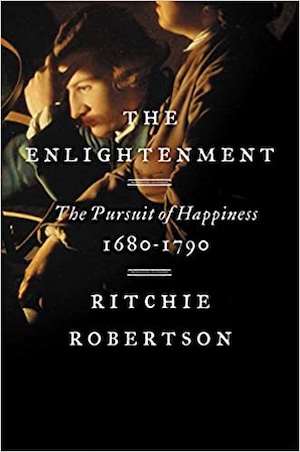By David Madden
Hefting his 984 page Enlightenment, one may well wonder, Richie Robertson, what were you thinking? Following his thinking, I, for one, experienced a wonderful reading adventure.
Covering 1680 through 1790, eleven decades of the most intense thinking and far-reaching reputation of the Enlighteners, Robertson, a professor of German Language and Literature at Oxford University, leads us into a study of the Enlightenment “as a coherent intellectual movement united by ‘a commitment to understanding and advancing causes and conditions of human betterment in this world.’” Diderot and the Encyclopedists examined “the genealogy and filiations of our knowledge, the causes that must have given them birth, and the characters that distinguish them… to ascend to the origins and generation of our ideas.”
I asked to review this book because I was eager to learn more about the Enlightenment, but the subtitle “The Pursuit of Happiness” seemed a somewhat shallow reason to take on nearly a thousand pages. At 88, I am already happy enough. And, as if he suspected a reluctance, Robertson insists on ringing that bell, until finally I gave in and settled with it, along with my own shifting perspectives, quite contentedly.
It has been a rare, intellectually exhilarating experience to review what I have known over the years of the thinking of Diderot, Burke, Hume, Bacon, William Penn, Paine, Descartes, Schiller, Herder, Spinoza, Adam Smith, Goethe, Lessing, Voltaire, and Rousseau, and to learn more about them, along with learning for the first time what was on the fertile minds of Pierre Bayle, “one of the most attractive and intriguing figures of the Enlightenment”; Christolph Martin Wieland, a major defender of the ideal of world citizenship; Georg Forster, world traveler who studied colonial violence; and especially Catherine Macaulay, “the first female English historian,” among many others.
Richardson’s own insights and judgments; his witty, lucid style; and the brisk pace that such a book as his needs are likely to keep readers attentive and engaged, as he stirs up a perfect storm of ideas on a vast range of subjects that I imagine will appeal to almost every one’s serious interest: reason and passion, scientific revolution, tolerance, religion, unbelief and speculation, science and sensibility, sociability, practical matters such as the police, aesthetics, the science of society, philosophical history, forms of government, revolutions, and in conclusion, “The Battle Over the Enlightenment.”
A novelist, historian, memoirist, and literary critic, David Madden (ΦBK, University of Tennessee) is well into work on a book about the emotional, imaginative, and intellectual effects of myriad-mindedness.




